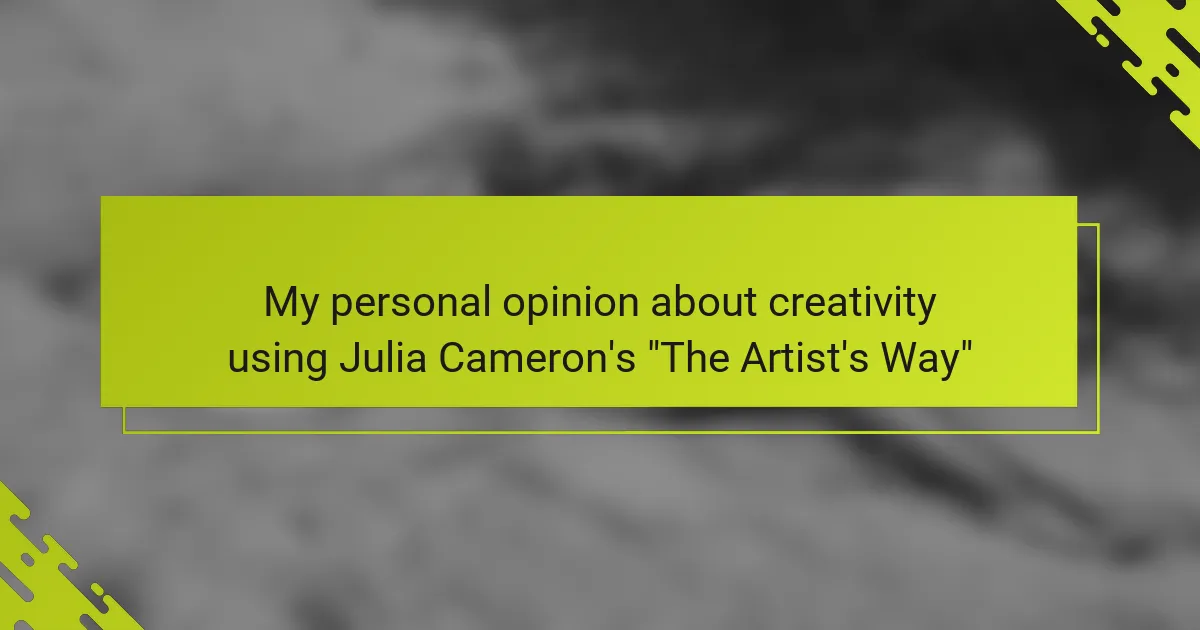Key takeaways
- Creativity in queer women culture serves as both a refuge and a means of reclaiming identity, supported by community and shared experiences.
- Julia Cameron’s The Artist’s Way emphasizes creative expression as a spiritual practice, using techniques like Morning Pages and Artist Dates to nurture creativity.
- Applying The Artist’s Way within queer women’s contexts fosters self-love, community connection, and transforms creative practices into acts of resistance and affirmation.
- Practical exercises focused on emotions, intentional queer Artist Dates, and collaborative creativity are vital for cultivating a supportive and inspiring artistic environment.
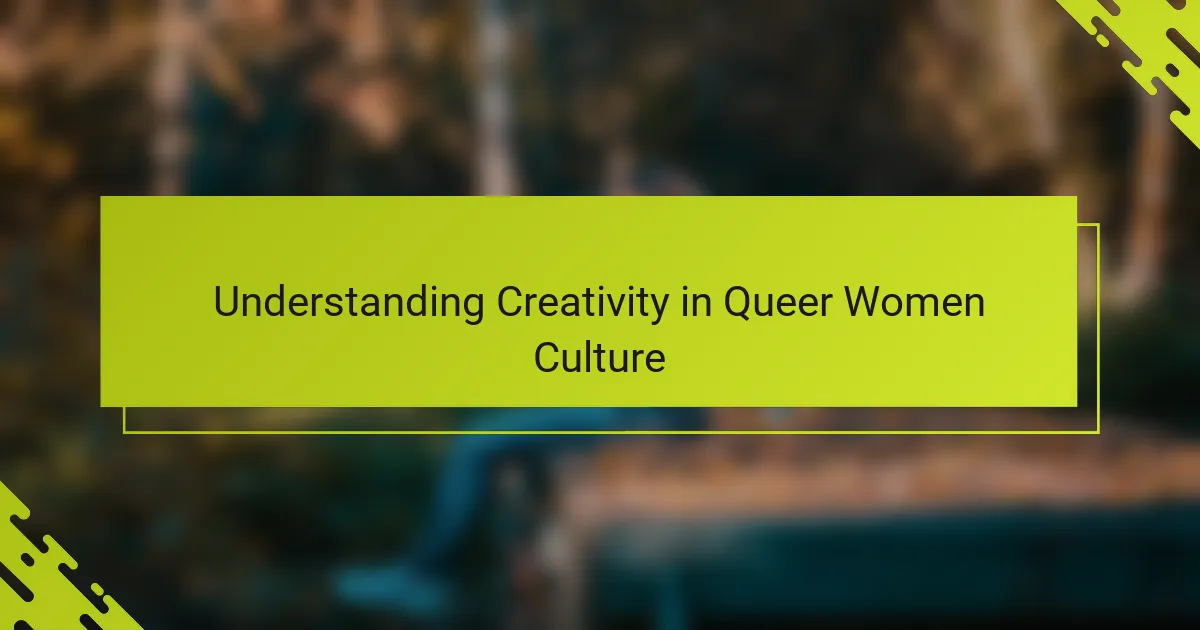
Understanding Creativity in Queer Women Culture
Creativity in queer women culture often feels like both a refuge and a rebellion. I’ve noticed that it’s not just about making art—it’s about reclaiming identity in spaces that frequently try to erase us. Have you ever felt your creative spark ignite as a way to say, “I exist, and I matter”?
What strikes me most is how community shapes this creativity. Sharing stories, struggles, and joyful moments fuels a unique artistic energy that’s deeply personal yet collective. It’s like being part of an unspoken conversation where every creation is both a shout and a whisper.
At times, I’ve wondered how much of my own creative drive is tied to this cultural context—does knowing the history of queer resilience make my work bolder? For me, embracing this perspective turns creativity into a radical act of self-love and connection.
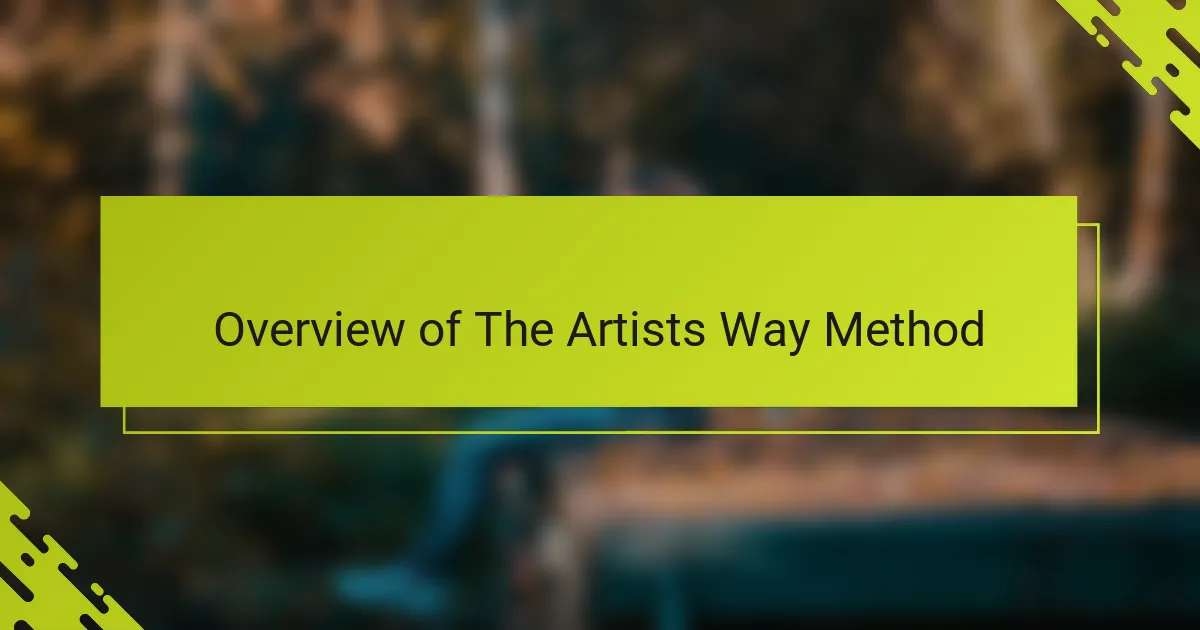
Overview of The Artists Way Method
The Artist’s Way method, to me, feels like a kind of gentle yet powerful roadmap back to one’s creative self. Julia Cameron’s approach isn’t about forcing ideas but about uncovering what’s already there, waiting beneath layers of doubt and distraction. Have you ever noticed how writing down your thoughts first thing in the morning can clear a fog I sometimes didn’t even realize was clouding my creativity?
One of the most memorable parts of The Artist’s Way for me has been the practice of Morning Pages—three pages of longhand writing done every day. At first, it felt tedious, almost like a chore, but soon I started seeing it as a conversation with myself, a way to listen to the thoughts I often ignored. This daily ritual transformed how I approached creative blocks, turning frustration into curiosity.
Another core idea Cameron presents is the concept of “Artist Dates,” intentional solo excursions to nurture your inner artist. I’ve found these moments surprisingly restorative, as if I’m giving myself permission to play and explore without judgment. Don’t you think embracing such rituals can shift not just how we create, but how we value our own creative journeys?
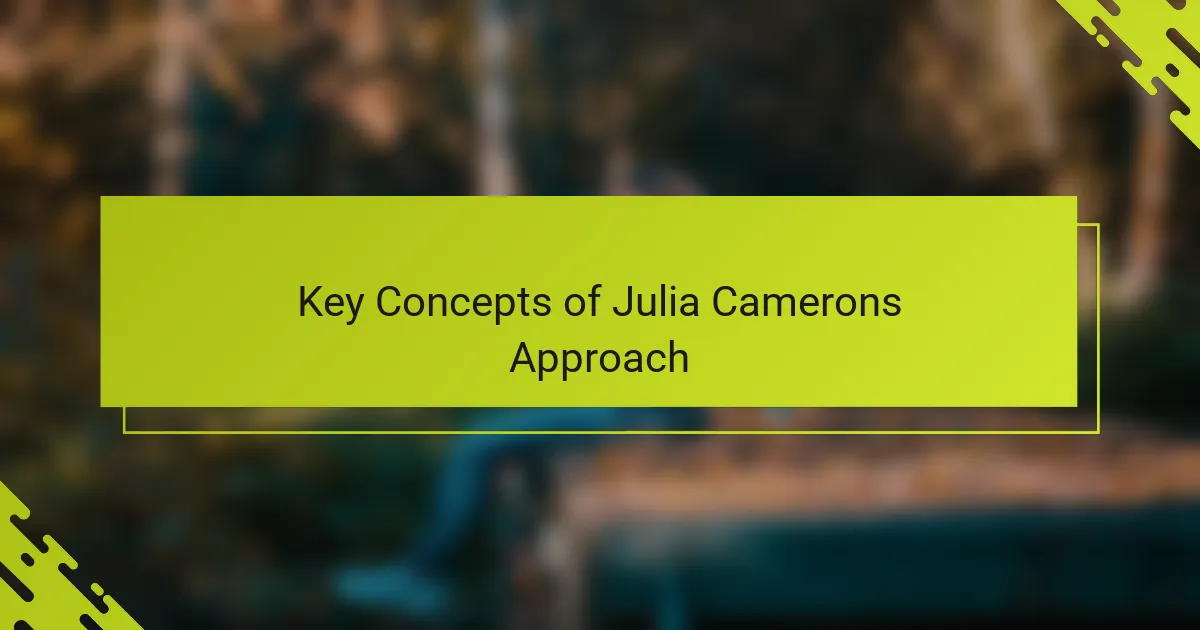
Key Concepts of Julia Camerons Approach
One of Julia Cameron’s key concepts that really resonated with me is the idea of creativity as a spiritual practice rather than just a skill. She encourages us to view creative blocks not as failures but as signals—maybe even invitations—to slow down and reconnect with ourselves. Have you ever felt that frustration fade when you stopped pushing and started listening inwardly?
Another concept that feels powerful in my experience is the emphasis on routine, especially through Morning Pages. Writing without censorship every morning became a way to clear mental clutter. It’s like opening a window in a stuffy room—I found new energy just by giving myself space to be messy and honest first thing every day.
Finally, Cameron’s idea of “Artist Dates” has transformed how I nurture my creativity. Taking solo time to explore something fun or curious reminded me that creativity isn’t always about output—it’s also about joy and play. Do you ever notice how a simple walk or a visit to a gallery can reignite ideas waiting quietly underneath the surface? For me, these dates became essential pauses that fueled deeper creative work.
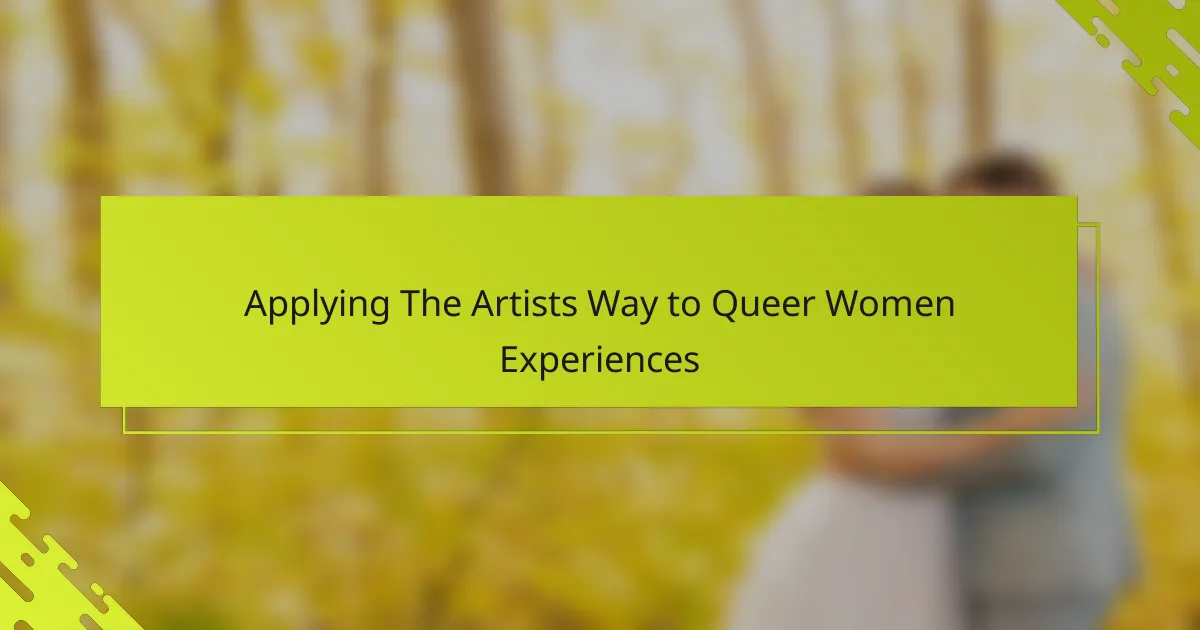
Applying The Artists Way to Queer Women Experiences
Applying The Artist’s Way to queer women’s experiences feels like an act of reclaiming both identity and creative power. For me, the Morning Pages became more than a routine—they were moments to gently confront the internalized doubts shaped by living in a world that often misunderstands or marginalizes queer women. Have you ever found writing to be a way to untangle not just ideas, but complex feelings about belonging and visibility?
What struck me most was how the Artist Dates took on a new dimension when rooted in queer culture. Those solo excursions weren’t just about nurturing creativity—they became small rituals of self-affirmation, little acts of resistance against erasure. I remember one Artist Date wandering through a neighborhood known for its queer history; the experience grounded me, transforming creative play into a celebration of heritage.
Ultimately, using Julia Cameron’s methods within queer women’s contexts opened doors to deeper self-love and community connection. How often do we overlook the power of routine and solitude as tools for healing? For me, blending The Artist’s Way with my personal story turned creative work into something fiercely personal yet universally human.
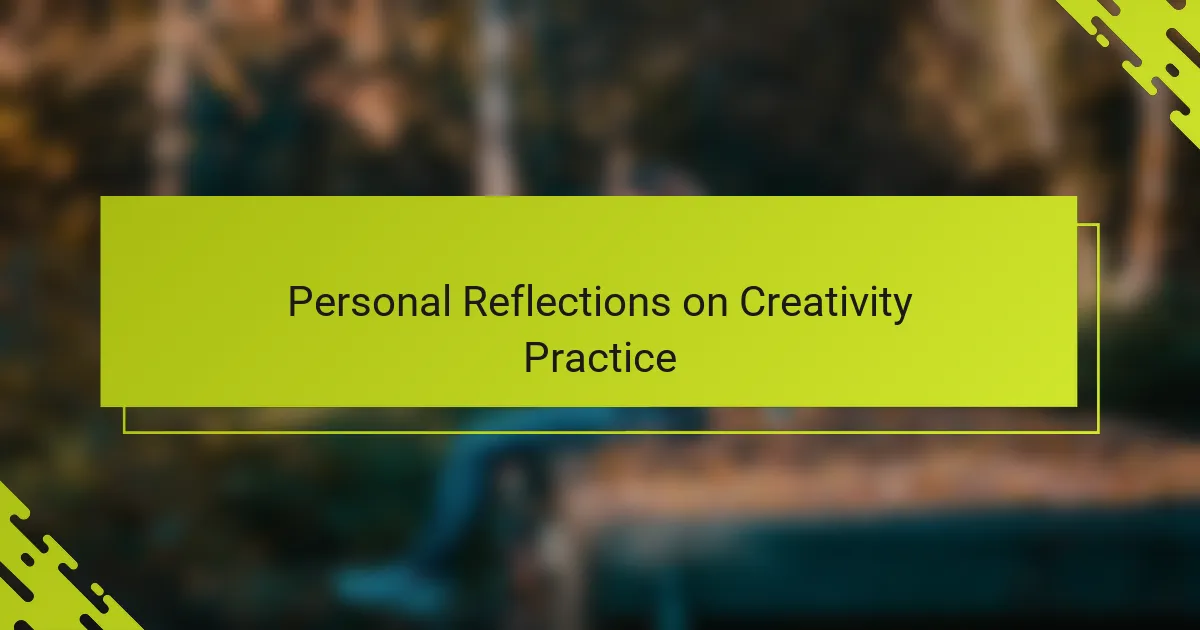
Personal Reflections on Creativity Practice
Sometimes, when I sit down to do my Morning Pages, I catch myself spiraling into doubt—wondering if what I’m creating even matters. But then I remind myself that this messy, unfiltered writing is less about product and more about process. Have you ever experienced that relief when you stop judging your thoughts and just let them flow freely?
There was a moment during one of my Artist Dates when I wandered through an old bookstore, searching for nothing in particular. That aimless exploration sparked a flood of ideas I hadn’t noticed before. It made me realize creativity isn’t always a grand act—it often lives in these small, quiet moments of play and curiosity.
I’ve noticed that the practice of creativity, especially within a framework like The Artist’s Way, becomes deeply personal and sometimes emotional. It’s like peeling back layers of myself I hadn’t dared to explore, quietly uncovering fears, hopes, and truths. Doesn’t creativity, in this way, become a form of self-discovery as much as self-expression?
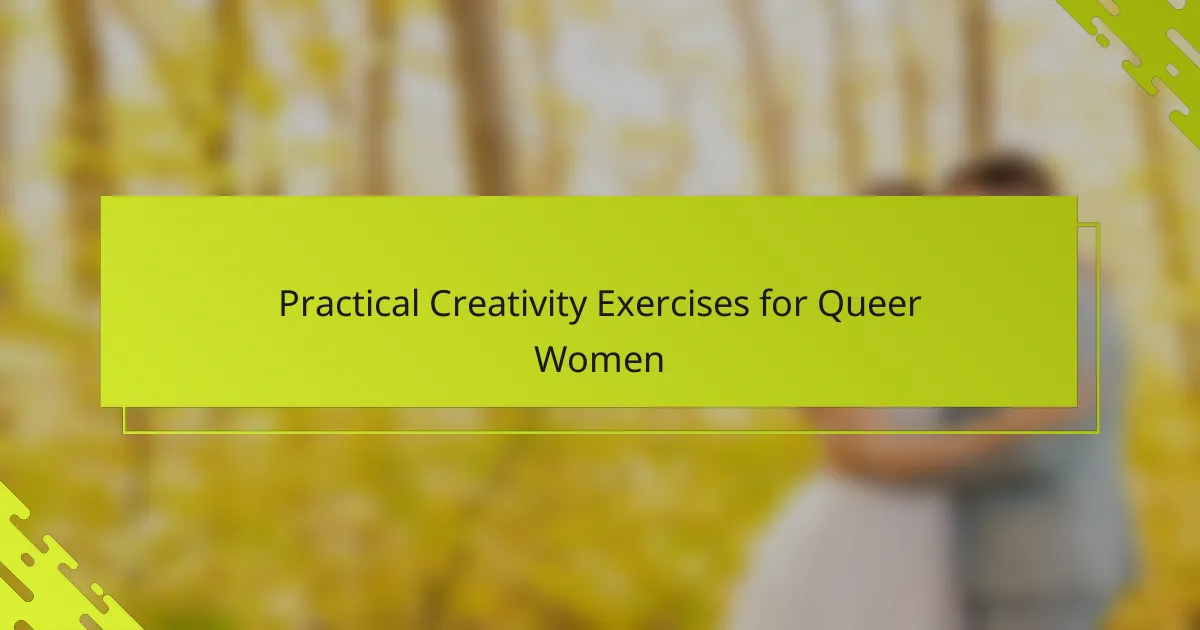
Practical Creativity Exercises for Queer Women
Finding practical creativity exercises that resonate with queer women means honoring both our unique identities and our need for safe, nurturing spaces. One exercise I swear by is adapting Morning Pages to focus specifically on emotions surrounding queerness—writing without judgment about fears, joys, or memories tied to our experiences. Have you tried letting your pen wander through those intimate feelings? It’s astonishing how much clarity and courage can emerge from this simple, private ritual.
Another exercise I cherish is crafting “Queer Artist Dates” with intention. Instead of generic solo adventures, I pick places or activities that celebrate or explore queer culture—like visiting queer bookstores, attending community events, or creating in spaces where queer history resonates deeply. These mini pilgrimages become both creative fuel and acts of self-love. How often do we gift ourselves such affirming moments? For me, they transform creativity from a task into a radical, life-affirming practice.
Lastly, engaging in collaborative creativity with fellow queer women can be profoundly healing and inspiring. Whether it’s a writing circle, a small art project, or simply sharing work with trusted friends, this collective energy lifts my creative spirit in ways solo work can’t always reach. Have you noticed how vulnerability shared with others becomes a superpower? In my experience, blending solitude and community keeps my creative fire burning bright.
